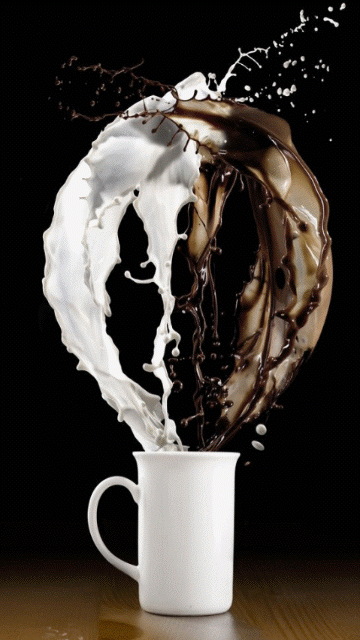☕️ 11 Reasons ☕️
Why You Should Drink Coffee
Every Day

There really can't be any adult in this great big world that has
never tried coffee. It's consumed everywhere, and judging by the amount
of Starbucks locations in the United States alone, (in 2012, there were 10,924!) we love our caffeine.
And that's fine. In fact, there are many advantages to being one of the 54 percent of Americans over 18 who drink coffee everyday.
Coffee can be pretty amazing for your brain, your skin and your body.
Read on to discover 11 reasons you should wake up and smell the
coffee...
Americans get more antioxidants from coffee than anything else.
According to a study done in 2005, "nothing else comes close" to providing as many antioxidants as coffee. While fruits and vegetables also have tons of antioxidants, the human body seems to absorb the most from coffee.

Researchers at the Seoul National University examined the brains of rats who were stressed with sleep deprivation and discovered that those who were exposed to coffee aromas experienced changes in brain proteins tied to that stress.
Note, this aroma study doesn't relate to stress by itself, only to the
stress felt as a result of sleep deprivation. Now, we're not entirely
sure if this means you should keep a bag of roasted coffee beans on your
nightstand every night, but feel free to try!

Coffee could lessen the symptoms of Parkinson's disease.
ScienceDaily reported in 2012 that drinking coffee may help people with Parkinson's disease control their movement.
Ronald Postuma, MD, the study author, said, "Studies have shown that
people who use caffeine are less likely to develop Parkinson's disease,
but this is one of the first studies in humans to show that caffeine can
help with movement symptoms for people who already have the disease."
Coffee is great for your liver (especially if you drink alcohol).
A study published in 2006 that included 125,000 people over 22 years showed that those who drink at least one cup of coffee a day were 20 percent less to develop liver cirrhosis
-- an autoimmune disease caused by excessive alcohol consumption that
could lead to liver failure and cancer. Arthur L Klatsky, the lead
author of the study, told The Guardian, "Consuming coffee seems to have
some protective benefits against alcoholic cirrhosis, and the more
coffee a person consumes the less risk they seem to have of being
hospitalised or dying of alcoholic cirrhosis."
Studies have also shown that coffee can help prevent people from
developing non-alcoholic fatty liver disease (NAFLD). An international
team of researchers led by Duke-NUS Graduate Medical School revealed
that drinking four or more cups of coffee or tea a day may be beneficial in preventing the progression of NAFLD.

A study done by the National Institute of Health
found that those who drink four or more cups of coffee were about 10
percent less likely to be depressed than those who had never touched the
java. And apparently it's not because of the "caffeine high" -- Coke
can also give you a caffeine high, but it's linked to depression. Study author, Honglei Chen, MD, PhD, told Prevention.com that the proposed reason coffee makes you feel good is because of those trusty antioxidants.

A study done by the Harvard School of Public Health
determined that drinking between two and four cups of coffee can reduce
the risk of suicide in men and women by about 50 percent. The proposed
reason is because coffee acts as a mild antidepressant by aiding in the production of neurotransmitters like serotonin, dopamine and noradrenaline.

Brigham and Women's Hospital and Harvard Medical School followed 112,897 men and women over a 20-year period
and, apparently, women who drink three or more cups of coffee a day are
much less likely to develop skin cancer than those who don't.

The New York Times reports,
"Scientists and many athletes have known for years, of course, that a
cup of coffee before a workout jolts athletic performance, especially in
endurance sports like distance running and cycling." Caffeine increases the number of fatty acids in the bloodstream,
which allows athletes' muscles to absorb and burn those fats for fuel,
therefore saving the body's small reserves of carbohydrates for later on
in the exercise.

Coffee also lowers risk of Type 2 diabetes, according to a study from The American Chemical Society. The study's researchers found that people who drink four or more cups of coffee a day reduce their chances of developing Type 2 diabetes by 50 percent. Subsequently, with every additional cup, the risk gets lowered by 7 percent.


Researchers from the University of South Florida and the University
of Miami found that people older than 65 who had higher blood levels of
caffeine developed Alzheimer's disease two to four years later than others with lower caffeine. Dr. Chuanhai Cao, a neuroscientist at the USF, and co-author of the study, said,
"We are not saying that moderate coffee consumption will completely
protect people from Alzheimer's disease. However, we firmly believe that
moderate coffee consumption can appreciably reduce your risk of
Alzheimer's or delay its onset."

Coffee may make you more intelligent.
You usually drink coffee when you are sleep-deprived, right? Well,
that much-needed jolt not only keeps you awake, it makes you sharper. CNN reports that coffee allows your brain to work in a much more efficient and smarter way. TIME reporter, Michael Lemonick, says,
"When you're sleep-deprived and you take caffeine, pretty much anything
you measure will improve: reaction time, vigilance, attention, logical
reasoning -- most of the complex functions you associate with
intelligence."
Moral of the story?
COFFEE IS THE BEST THING EVER.
KEEP DRINKING IT.
http://www.huffingtonpost.com/2013/10/17/coffee-health-benefits_n_4102133.html?utm_hp_ref=mostpopular

Coffee is number one source of antioxidants
Coffee provides more than just a morning jolt; that steaming cup of java is also the number one source of antioxidants in the U.S. diet, according to a new study by researchers at the University of Scranton (Pa.). Their study was described today at the 230th national meeting of the American Chemical Society, the world's largest scientific society.
"Americans get more of their antioxidants from coffee than any other dietary source. Nothing else comes close," says study leader Joe Vinson, Ph.D., a chemistry professor at the university. Although fruits and vegetables are generally promoted as good sources of antioxidants, the new finding is surprising because it represents the first time that coffee has been shown to be the primary source from which most Americans get their antioxidants, Vinson says. Both caffeinated and decaf versions appear to provide similar antioxidant levels, he adds.
He cautions that high antioxidant levels in foods and beverages don't necessarily translate into levels found in the body. The potential health benefits of these antioxidants ultimately depends on how they are absorbed and utilized in the body, a process that is still poorly understood, says Vinson, whose study was primarily funded by the American Cocoa Research Institute.
The news follows a growing number of reports touting the potential health benefits of drinking coffee. It also comes at an appropriate time: Coffee consumption is on the rise in the United States and over half of Americans drink it everyday, according to the National Coffee Association.
Antioxidants in general have been linked to a number of potential health benefits, including protection against heart disease and cancer. For the current study, Vinson and his associates analyzed the antioxidant content of more than 100 different food items, including vegetables, fruits, nuts, spices, oils and common beverages. The data was compared to an existing U.S. Department of Agriculture database on the contribution of each type of food item to the average estimated U.S. per capita consumption.
Coffee came out on top, on the combined basis of both antioxidants per serving size and frequency of consumption, Vinson says. Java easily outranked such popular antioxidant sources as tea, milk, chocolate and cranberries, he says. Of all the foods and beverages studied, dates actually have the most antioxidants of all based solely on serving size, according to Vinson. But since dates are not consumed at anywhere near the level of coffee, the blue ribbon goes to our favorite morning pick-me-up as the number one source of antioxidants, he says.
Besides keeping you alert and awake, coffee has been linked to an increasing number of potential health benefits, including protection against liver and colon cancer, type 2 diabetes, and Parkinson's disease, according to some recently published studies.
Coffee provides more than just a morning jolt; that steaming cup of java is also the number one source of antioxidants in the U.S. diet, according to a new study by researchers at the University of Scranton (Pa.). Their study was described today at the 230th national meeting of the American Chemical Society, the world's largest scientific society.
"Americans get more of their antioxidants from coffee than any other dietary source. Nothing else comes close," says study leader Joe Vinson, Ph.D., a chemistry professor at the university. Although fruits and vegetables are generally promoted as good sources of antioxidants, the new finding is surprising because it represents the first time that coffee has been shown to be the primary source from which most Americans get their antioxidants, Vinson says. Both caffeinated and decaf versions appear to provide similar antioxidant levels, he adds.
He cautions that high antioxidant levels in foods and beverages don't necessarily translate into levels found in the body. The potential health benefits of these antioxidants ultimately depends on how they are absorbed and utilized in the body, a process that is still poorly understood, says Vinson, whose study was primarily funded by the American Cocoa Research Institute.
The news follows a growing number of reports touting the potential health benefits of drinking coffee. It also comes at an appropriate time: Coffee consumption is on the rise in the United States and over half of Americans drink it everyday, according to the National Coffee Association.
Antioxidants in general have been linked to a number of potential health benefits, including protection against heart disease and cancer. For the current study, Vinson and his associates analyzed the antioxidant content of more than 100 different food items, including vegetables, fruits, nuts, spices, oils and common beverages. The data was compared to an existing U.S. Department of Agriculture database on the contribution of each type of food item to the average estimated U.S. per capita consumption.
Coffee came out on top, on the combined basis of both antioxidants per serving size and frequency of consumption, Vinson says. Java easily outranked such popular antioxidant sources as tea, milk, chocolate and cranberries, he says. Of all the foods and beverages studied, dates actually have the most antioxidants of all based solely on serving size, according to Vinson. But since dates are not consumed at anywhere near the level of coffee, the blue ribbon goes to our favorite morning pick-me-up as the number one source of antioxidants, he says.
Besides keeping you alert and awake, coffee has been linked to an increasing number of potential health benefits, including protection against liver and colon cancer, type 2 diabetes, and Parkinson's disease, according to some recently published studies.
But there's also a downside: Java can make you jittery and cause stomach pains, while some studies have tied it to elevated blood pressure and heart rates. More research is needed, particularly human studies, to firmly establish its health benefits, Vinson says.
While the findings would seem to encourage people to go out and drink more coffee, Vinson emphasizes moderation. "One to two cups a day appear to be beneficial," he says. If you don't like coffee, consider drinking black tea, which is the second most consumed antioxidant source in the U.S. diet, Vinson says.
While the findings would seem to encourage people to go out and drink more coffee, Vinson emphasizes moderation. "One to two cups a day appear to be beneficial," he says. If you don't like coffee, consider drinking black tea, which is the second most consumed antioxidant source in the U.S. diet, Vinson says.
Bananas, dry beans and corn placed third, fourth and fifth, respectively.
But don't forget about fresh fruits and veggies, the researcher cautions. "Unfortunately, consumers are still not eating enough fruits and vegetables, which are better for you from an overall nutritional point of view due to their higher content of vitamins, minerals and fiber," Vinson says. Dates, cranberries and red grapes are among the top fruits for antioxidants on the basis of concentration (antioxidants per serving size), he says
The American Chemical Society is a nonprofit organization, chartered by the U.S. Congress, with a multidisciplinary membership of more than 158,000 chemists and chemical engineers. It publishes numerous scientific journals and databases, convenes major research conferences and provides educational, science policy and career programs in chemistry. Its main offices are in Washington, D.C., and Columbus, Ohio.
The paper on this research, AGFD 10, will be presented at 8:30 a.m., Sunday, Aug. 28, at the Washington Convention Center, Room 203A, during the symposium "The Potential Health Benefits of Antioxidants."
Source: American Chemical Society
Read more at: http://phys.org/news6067.html#jCp
But don't forget about fresh fruits and veggies, the researcher cautions. "Unfortunately, consumers are still not eating enough fruits and vegetables, which are better for you from an overall nutritional point of view due to their higher content of vitamins, minerals and fiber," Vinson says. Dates, cranberries and red grapes are among the top fruits for antioxidants on the basis of concentration (antioxidants per serving size), he says
The American Chemical Society is a nonprofit organization, chartered by the U.S. Congress, with a multidisciplinary membership of more than 158,000 chemists and chemical engineers. It publishes numerous scientific journals and databases, convenes major research conferences and provides educational, science policy and career programs in chemistry. Its main offices are in Washington, D.C., and Columbus, Ohio.
The paper on this research, AGFD 10, will be presented at 8:30 a.m., Sunday, Aug. 28, at the Washington Convention Center, Room 203A, during the symposium "The Potential Health Benefits of Antioxidants."
Source: American Chemical Society
Read more at: http://phys.org/news6067.html#jCp


No comments:
Post a Comment